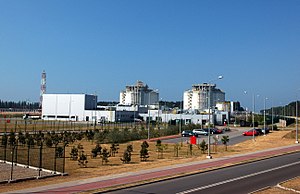

The Świnoujście LNG terminal (also referred as Terminal LNG in Świnoujście, Polskie LNG Baltic LNG, or gazoport) is a liquefied natural gas (LNG) import terminal at Świnoujście, in the extreme north-west of Poland near the Polish-German border. The LNG terminal is operated by Polskie LNG S.A., a subsidiary of Gaz-System. The cornerstone for construction was laid on 23 March 2011 and it took its first LNG delivery on 11 December 2015. The terminal's regasification capacity is 5 billion cubic metres per annum (180 billion cubic feet per annum). The terminal is currently being expanded and once the expansion is complete in 2023, it will have a capacity of 7.5 billion cubic metres per annum (260 billion cubic feet per annum) and be able to satisfy about half of Poland's annual natural gas demand. Together with the 10 bcm of natural gas that Poland will (starting in 2023) receive annually from Norway via the Baltic Pipe natural gas pipeline, the Świnoujście LNG terminal will allow Poland to achieve its long-term goal of becoming fully independent of Russian natural gas, which had previously been the source of almost all of the country's natural gas.
History


Discussions about the project started in 2006. The project was originally developed by PGNiG through its subsidiary Polskie LNG S.A. In January 2008, SNC-Lavalin was chosen for the front-end engineering design. The engineering, procurement and construction contract was signed with a consortium of Saipem, Techint, Snamprogetti, and PBG. Construction started in March 2011. The first LNG delivery to the terminal is expected on 11 December 2015. After creation of Gaz-System and its separation from PGNiG, the newly created company took over the ownership of Polskie LNG S.A. The terminal was inaugurated by prime minister Ewa Kopacz on 12 October 2015. The gas carrier has delivered the first order on 11 December 2015.
The total cost of the terminal is €950 million (PLN 3.638 billion), including PLN 888 million in grants, subsidies, and loans from the European Union.
Technical description

The terminal has unloading jetty for large LNG tankers, two storage tanks and regasification train. The terminal's initial regasification capacity is 5 billion cubic metres per annum (180 billion cubic feet per annum), and this is expected to reach 7.5 billion cubic metres per annum (260 billion cubic feet per annum) in 2023 once its expansion is complete.
Expansion

In June 2020, Polskie LNG and the Szczecin and Świnoujście Seaports Authority signed agreements with the consortium of PORR SA and TGE Gas Engineering GmbH for the expansion of the LNG terminal. The construction of the third tank will increase the terminal's capacity from 5 billion cubic metres per annum (180 billion cubic feet per annum) to 7.5 billion cubic metres per annum (260 billion cubic feet per annum), satisfying approximately 50% of Poland's annual gas demand. The agreements concern the expansion of the land and sea parts of the terminal. Polskie LNG will be responsible, inter alia, for the construction of a new LNG tank with a capacity of approximately 180 thousand cubic metres (6.4 million cubic feet) and construction of the technological part of the new ship berth for unloading, loading and bunkering LNG. Upon completion of the works, the nominal regasification capacity of the terminal will increase to 7.5 billion cubic metres per annum (260 billion cubic feet per annum). The construction of the third tank is expected to be completed by 2023 and will cost approximately PLN 1.9 billion.
There is a plan to create a gas corridor from the Świnoujście terminal to Adria LNG terminal in Croatia, and a pipeline between Poland and Slovakia was opened in 2022.
See also
- 2022 Russia–European Union gas dispute – Fossil fuel financing-related conflicts
- Baltic Pipe – Natural gas pipeline from Europipe II to Poland
- Energy in Poland
- Gas Interconnection Poland–Lithuania – Natural gas pipeline
- Klaipėda LNG terminal – LNG terminal in Lithuania
- List of LNG terminals
References
- ^ "Pierwsza dostawa katarskiego LNG dotarła do Polski". Defence24.pl. Archived from the original on 2015-12-13. Retrieved 2022-06-02.
- Reed, Stanley (2019-02-26). "Burned by Russia, Poland Turns to U.S. for Natural Gas and Energy Security". The New York Times. ISSN 0362-4331.
- ^ "Swinoujscie LNG Gas Terminal, Poland". hydrocarbons-technology.com. Net Resources International. Retrieved 2013-06-19.
- "LNG Świnoujście general contractor selected". Warsaw Business Journal. 2010-06-25. Retrieved 2013-06-19.
- "Construction on Świnoujście LNG terminal to start in March". Warsaw Business Journal. 2011-01-25. Retrieved 2013-06-19.
- "Świnoujście terminal to accept delivery from Qatar". Warsaw Business Journal. 2015-11-20. Retrieved 2015-11-25.
- "Świnoujście gas terminal officially opened". Radio Poland. 2015-10-12. Retrieved 2015-11-25.
- Onoszko, Maciej (2012-04-04). "Poland, Slovakia take step towards gas link". Reuters. Archived from the original on March 6, 2016. Retrieved 2013-06-19.
- Hebda, Wiktor (2 November 2021). "The North-South Gas Corridor in the Context of Poland's Gas Transmission System—A Perfect Opportunity to Diversify Gas Resources". Energies. 14 (21): 7188. doi:10.3390/en14217188.
- "Diversification of gas supply sources and integration of gas infrastructure in the Three Seas Region - Three Seas". projects.3seas.eu. Archived from the original on 3 December 2022.
- Harper, Jo (2019-03-27). "Can Poland break Gazprom's grip?". dw.com.
- "PL-SK gas interconnector connects North-South Gas Corridor opening new supply routes for the whole region - CEENERGYNEWS". ceenergynews.com. 26 August 2022.
- "North – South Gas Corridor in Eastern Poland" (PDF).
External links
 Media related to LNG terminal in Świnoujście at Wikimedia Commons
Media related to LNG terminal in Świnoujście at Wikimedia Commons- Polskie LNG S.A.
53°54′33″N 14°17′41″E / 53.90917°N 14.29472°E / 53.90917; 14.29472
Categories: